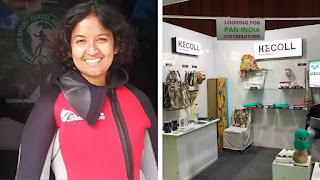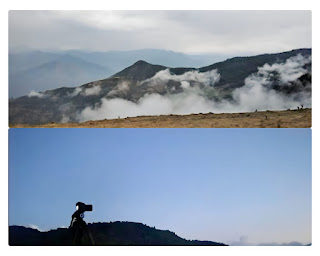It's about something buzzing in me,buzzing in you.The blog is all about listening to one's own inner voice capable of inspiring the lives,the nations and the humanity. It can be a short story,a poem or little deeds of heroes around. let's shift from craftyness of mind to that inner sound buzzing in you,buzzing in me.
Sunday, July 23, 2023
An Innovative Waste Management Startup - Swaaha
Sunday, July 16, 2023
The Iceman of India - Chewang Norphel
The Iceman of India - Chewang Norphel
The Biography
His first visit to Ladakh
The seeding of an idea
The Rise of a Solution
Execution of the idea
A Wave of positivity in Agriculture
Awarding Padma Shri
Sunday, July 9, 2023
Deepthi Nathala - the innovator behind Hecoll fabric
Deepthi Nathala - the innovator behind Hecoll fabric
The birth of Hecoll
Applying Nanotechnology
Start of Production
Certifications
The company profile
Challenges in life
Sunday, June 18, 2023
Swami Hitanand - A Ray of Hope in Aboojhmaad
Swami Hitanand - A Ray of Hope in Aboojhmaad
Swamiji - A ray of hope
A Courageous Beginning
A Kick Start
The Mission continues
Thursday, June 8, 2023
Green Man of India - Rohit Mehra
Green Man of India - Rohit Mehra
Flashback
A Hike to Greenery
Vertical Gardens - the first project
Developing Urban Forest
The tree Hospital and Mobile tree ATM
One more unique endeavour in this series of environment protection is a Tree Hospital set up by the officer at Amritsar. With the help of some botanists ,Ayurvedacharyas and environmentalists, a tree ambulance is also placed there." Whenever a plant is dying, people contact us for suggesting remedies. In many cases we even sent ambulance to the home to protect the plant" says Mehra. On an average, Mehra gets 25 to 30 calls everyday for treating plants. Also they have a mobile tree ATM from where they distribute two free plants to the people who promise to take care of them.The seed balls
Achievements
Tuesday, April 25, 2023
Benital - India's first Astro Village
Benital - India's first Astro Village
The paradise of nature
A new trend in Tourism
The live Experience
Sunday, April 16, 2023
Kisaan school of Chattisgarh
Chhattisgarh's First Kisaan School
Baheradih village of Janjgir Champa district of Chhattisgarh has made its identity all over the country and it doesn't needs introduction anymore. Chhattisgarh first Kisan school is being opened here and very soon it has become a model for farmers across the country. The school is excelling not only in farming and farmer's training but also generating employment opportunities for the villagers.
The Man Behind
On 23 December, 2021, a progressive former named Deendayal Yadav of Baheradih village of baloda block of Janjgir Champa district lead the foundation of first Kisan school in Chhattisgarh on the occasion of Kisan Divas. Deendayal Yadav has been experimenting on vegetables since 2010-11 and those efforts became fruitful with the opening of Kisan school in 2021. The School has been a role model for farmers as it is carrying out new and innovative experiments on crops and vegetables with the help of Agriculture department and the process is still in progress.
The Journey of Innovation
Farmer Deendayal narrates his story " In 2012, I got a sample of half kilogram Australian Eisenia Fetida earthworm for vermicomposting from Agriculture department. " Afterwards he himself started producing these earthworms . At present he has produced more than 12 quintals of earthworms and earned more than 12 lakhs by selling them. Also 8 lakh rupees have been earned by making vermicompost with those earthworms. He is also supplying these earthworms and vermicompost to government "Gothans". He is facing excess demand for them.
The Journey Ahead
This is not the end of the journey it is only one aspect of it. The School has patented not only 36 kinds of vegetables including Aamari, Chench and Chaulai bhaji but also many varieties of rice. The farmers are not only getting training in organic farming but they are also learning to make organic compost here which is proving to be greatly beneficial in the farming of vegetables and other plants like moringa, papaya, mango and lemon.
Courses Run in School
Any farmer of any age can enroll in various courses running in the school free of cost . Apart from vermicomposting and production of earthworms there are various schools of learning like mushroom production ,dairy farming, vegetable farming ,biogas plant setup, terrace gardening, poultry farming, pisciculture , apiculture, organic pesticide production, animal fodder production and farmer rights protection information. The school will provide training to farmers as per their field of interest.
Milestones
The school's achievements doesn't stop here. It has fabricated jackets and rakhis through the fibres of amari and chench bhaji and banana. The school is also experimenting on four layer system of farming of fruits and vegetables. In 2013, Australian farmer Krrish and his wife Merilina has visited the school as a part of the research on organic farming. Many farmers from US and Australia have visited the school from time to time.
Talent needs no recognition rather it makes its own identity like a Shining Star among innumerable stars in the sky. This is applicable for Deendayal Yadav - the founder of Kisan School, a man dedicated for selfless service in the field of farming.
A Solar Powered village who won 5 national Awards
A Solar Powered village who won 5 National Awards Situated amidst lush green trees and mountains, is a village named Mukhra K in Telangana ...

-
Ashok Chakradhari - an Artisan from Chhattisgarh, the creator of Magic Lamp Just forget Aladdin's magical lamp ! Ashok Chakradhari ,a ...
-
Iha Dixit - A Green Warrior and environmentalist at the age of 10 An environmentalist ,a green warrior and an awardee of international Youn...
-
From ISRO Scientist to an Organic Date Farmer - a unique story An ex ISRO scientist and a pioneer in the field of organic date farming ,the...









